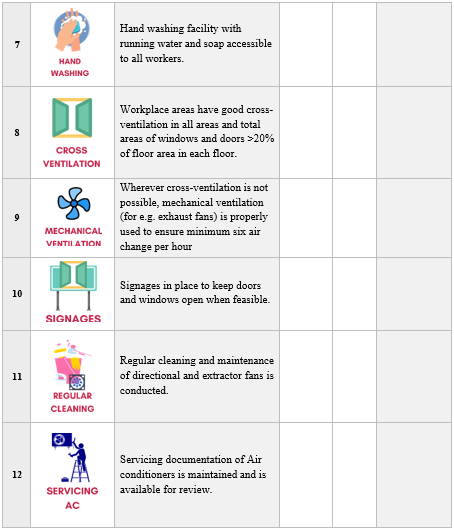Model Organization's Workplace Policy for Ending TB
Model Organization's Workplace Policy for Ending TBMODEL ORGANIZATION’S WORKPLACE POLICY FOR ENDING TB:
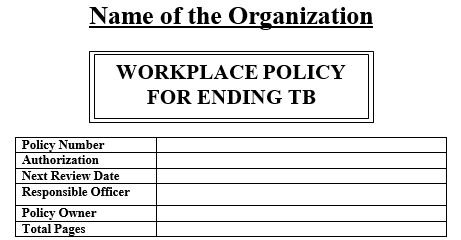
INTRODUCTION
In 2022, an estimated 10.6 million people fell ill with TB globally. India carries an estimated 27% of the global TB incidence with an estimated 28.2 lakh people contracting the disease and approximately 3.4 people succumbing to the disease every year. TB is known to cause a decline in workers’ productivity on the order of $13 billion every year.
It has become essential to create a work environment where TB is addressed and provision of TB services for the workers is made available. A healthy workforce results in higher productivity, making supportive workplace policies mutually beneficial for the industry and its employees. Institutional policies for TB can play a pivotal role in spreading awareness, creating a culture of support and inclusion and helping in the prevention and spread of TB. Every organization assume an accountability to adopt and implement a policy to end TB in their workplace. The following points outline the main pillars that set the standard for TB care at the workplace.
A brief introduction of the organization A short paragraph about the organization,
capturing its workforce and mission/values particularly with regards to health and wellness of employees. The organization has a role to play in contributing to a TB-Free India………………………
Scope of the policy: …………….…(Mention who all are covered in the policy) …………….……….
ORGANISATION’S POLICY
- The organization will treat TB as a workplace issue because it affects the health of workers and the productivity of the organization.
- The organization will not discriminate against workers based on known or presumed status of Tuberculosis. No one should experience discrimination on the basis of their TB status, whether in terms of continuing employment relationships or access to health insurance, occupational safety, and health care schemes.
- The organization will not ask job applicants or employees to disclose information whether they have TB or not. Access to personal data about health status of employees, including about TB will be kept confidential.
- Organization shall foster a culture of care towards workers who are afflicted with Tuberculosis.
- Prevention of TB will be a key priority. Continuous efforts will be made to make workers aware of symptoms of Tuberculosis, and the importance of early diagnosis and treatment
- Employees will be encouraged to seek voluntary TB screening, including self-screening
- Air-borne Infection Control measures will be promoted to prevent transmission of Tuberculosis among the workers.
- Counselling services will be ensured for workers and their family members seeking help on issues related to Tuberculosis.
- Support for treatment adherence and completion will be provided to all workers affected with TB.
- Provision of nutritional support to all workers undergoing treatment for TB.
- Employees with TB should be entitled to work for as long as they are medically fit and appropriate work is available. Reasonable accommodation will be provided to workers affected with TB to enable them to keep their jobs. This may include leave or temporary change in allotted duties to continue treatment or others until the situation demands.
- Information of all workers’ data diagnosed with TB will be updated in Ni-kshay.
Date:
Approved by:
Model for TB Free Workplace Committee
Model for TB Free Workplace CommitteeMODEL TOR FOR TB FREE WORKPLACE COMMITTEE:
TB Free Workplace Committee
Name of the Organization……………...
The economic burden of TB in terms of loss of lives, income and workdays is substantial. A large section of the population affected by TB also belong to the economically productive age group that results in a significant loss of working days, pushing people with TB further into the vortex of poverty due to catastrophic costs. Therefore, it is essential to create a work environment where TB is addressed and provision of TB services for the workers is made available. Every organization assumes an accountability to adopt and implement a policy to end TB in their workplace. Ongoing efforts are required to engage different departments and individuals for diversified representation. A workplace committee is formed to ensure proper planning, implementation, and monitoring of TB interventions in the workplace.
I. The Purpose of TB Free Workplace Committee
The TB Free workplace committee will help the management in planning and implementation of TB and workplace activities. The Committee will ensure equitable and gender sensitive approach to the implementation of TB prevention, treatment and care activities in the workplace.
II. Proposed Composition of TB Free Workplace Committee
The Committee would have representative from senior management as chair. Other members include representatives from Human Resource Department, Medical/OSH Unit, CSR wing, Welfare Department and representatives of workers. A person cured from TB/TB Champion may also be included in the committee. Additionally, committee’s gender balance may be maintained.
III. Roles & Responsibilities of the Committee
TB Free Workplace Committee would
1. Initiate and strengthen organization’s response to TB in the workplace.
2. Draft organization’s workplace policy/guidelines on ending TB.
3. Develop annual action plan and mobilize support including required resources for implementation
4. Organize TB awareness activities at/around the workplace premises
5. Address negative attitudes towards people with TB and increase awareness among the workers regarding TB
6. Ensure availability and display of relevant IEC materials at strategic locations across the workplace premises.
7. Ensure every health facility associated with ABC Organization has a Ni-kshay ID and every TB case detected in the organization to be enrolled in Ni-kshay Portal.
8. Facilitate linkage with the government’s social protection schemes so that the workers, particularly the contractual workers may avail the benefits.
9. Conduct periodic TB screening and ensure all workers with presumed TB are tested/evaluated.
10. Develop linkages with public or private diagnostic centres for referral of workers with presumed TB.
11. Ensure that list of local testing and treatment services for TB in Government and private sector is made available to all workers and their families.
12. Develop a mechanism to monitor the implementation of the policy/guidelines and activities for ending TB.
13. Document and disseminate good practices and learnings.
14. Publish a one-page annual report regarding the TB status and efforts to end TB in the workplace.
IV. Frequency of meetings
The committee may meet once in a quarter.
The minutes of the meetings need to be maintained.
Date:
Head of Management,
Name of the Organization……………
Checklist for implementing TB Free Workplace Interventions
Checklist for implementing TB Free Workplace InterventionsSuggested activity and monitoring framework for workplace response to becoming a ‘TB Free Workplace’:
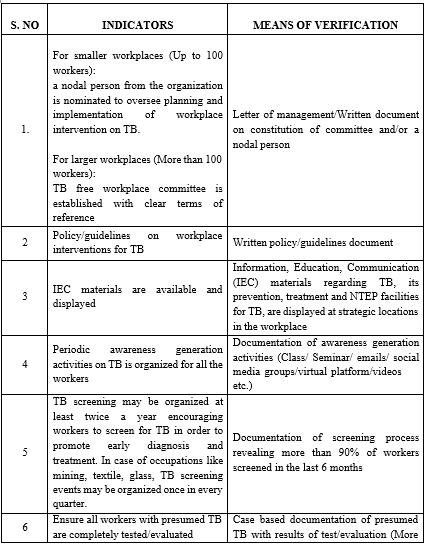
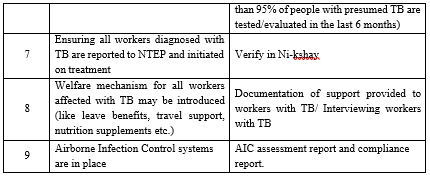
Role of NTEP at state and district level in implementing workplace intervention
Role of NTEP at state and district level in implementing workplace interventionState and District TB Cells play a crucial role in engaging workplaces to establish a TB free workplace setting. Their role includes:
- Mapping of key industries and leading business association/s in the state and districts respectively.
- States may develop a ‘State TB Workplace Policy’ in alignment with National Strategic Plan (NSP) and National Policy Framework to address TB and TB related co-morbidities in the world of work.
- Garnering political and administrative support for collaborating with different workplaces to initiate workplace intervention for TB.
- Developing state and district specific road-map or work plan for an intensified approach to influence different workplaces to adopt interventions for establishing a TB Free Workplace.
- Organize state and district level sensitization meetings and training programme for nodal officers of corporates for partnership for collaborative action.
- Providing technical support to engage workplaces in the TB space
- Supporting capacity building of management, workplace committee, peer educators, and health staff of workplace.
- Ensuring provisions for TB evaluation/testing, treatment initiation, and public health actions for the workers in collaboration with the workplace committee.
- Developing IEC materials and organize awareness generation activities on TB in the workplaces.
- States can develop checklist, reporting system, conduct programmatic review meetings to get update from Districts on corporate response on TB, conduct regular review meeting, field visit to corporates.
- District to conduct assessment and verify a corporate’s claim on being a TB Free Workplace.
- The State TB office to maintain a district-wise database of certified TB Free Workplaces.
- Documenting and disseminating best practices on workplace interventions for TB.
- Facilitate selected industries for outstanding contribution on TB intervention.
Air-borne Infection Control Check-list
Air-borne Infection Control Check-list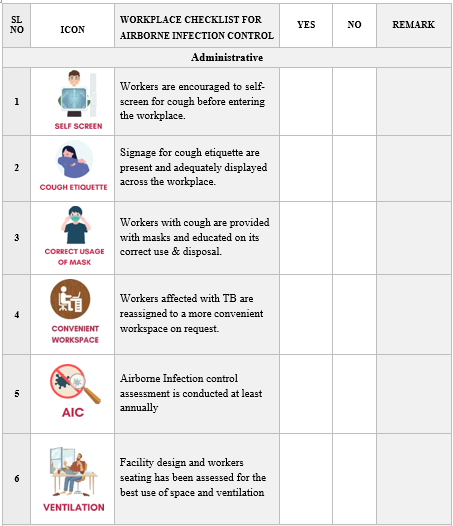
Environmental:
